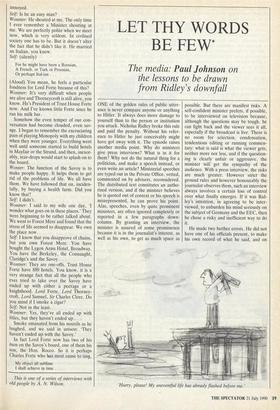LET THY WORDS BE FEW*
The media: Paul Johnson on
the lessons to be drawn from Ridley's downfall
ONE of the golden rules of public utter- ance is never compare anyone or anything to Hitler. It always does more damage to yourself than to the person or institution you attack. Nicholas Ridley broke this rule and paid the penalty. Without his refer- ence to Hitler he just conceivably might have got away with it. The episode raises another media point. Why do ministers give press interviews? What is in it for them? Why not do the natural thing for a politician, and make a speech instead, or even write an article? Ministerial speeches are typed out in the Private Office, vetted, commented on by advisers, reconsidered. The distributed text constitutes an autho- rised version, and if the minister believes he is quoted out of context or his speech is misrepresented, he can prove his point. Alas, speeches, even by quite prominent ministers, are often ignored completely or reported in a few paragraphs down- column. By granting an interview, the minister is assured of some prominence because it is in the journalist's interest, as well as his own, to get as much space as possible. But there are manifest risks. A self-confident minister prefers, if possible, to be interviewed on television because, although the questions may be tough, he can fight back and the viewer sees it all, especially if the broadcast is live. There is no room for selection, condensation, tendentious editing or running commen- tary: what is said is what the viewer gets, neither more nor less, and if the question- ing is clearly unfair or aggressive, the minister will get the sympathy of the audience. With a press interview, the risks are much greater. However strict the ground rules and however honourably the journalist observes them, such an interview always involves a certain loss of control over what finally emerges. If it was Rid- ley's intention, in agreeing to be inter- viewed, to unburden his mind seriously on the subject of Germany and the EEC, then he chose a risky and inefficient way to do it.
He made two further errors. He did not have one of his officials present, to make his own record of what he said, and on 'Hurry, please! My uneventful life has already flashed before me.' what terms. Journalists do not like this form of monitoring, but experience shows it is prudent. Secondly, Ridley seems to have agreed to some of what he said being on the record, and other parts off it, with a corresponding switching on and off of the tape-recorder. This often happens but it is a formula for confusion and acrimony, although in this particular case there was no possible room for misunderstanding. A sensible minister gives an interview either wholly on or wholly off the record, espe- cially if no official is there to note what was agreed. The only real safeguard is for the minister to insist, as a condition of granting the interview, on a written guarantee that the text, as it is to be published, be shown to him and an opportunity afforded to make changes. Journalists hate having such terms imposed on them as they wish to keep in any headline-catching indiscretion which may come their way. But that is precisely why the minister should insist. Had Ridley done so, he would still be Her Majesty's Secretary of State today.
Personally, if I were a minister I would go further and insist on having some control over the accompanying material. What injured Ridley most was not just his own reference to Hitler but the Garland cartoon on the cover. This was a brilliant piece of work and a perfectly legitimate exercise in hyberbolic exaggeration. But it compounded the damage Ridley did to himself because it was widely reproduced,
not least on the Continent, and must have led many people, who knew of the inter- view only from the headlines, to think that Ridley had actually compared Chancellor Kohl to Hitler. The conjunction of head- lines and cartoon is the only explanation I can find for some of the more abusive references to Ridley in even the stuffier Continental papers: the Frankfurter Allgemeine Zeitung referred to him as the `Europa-Hooligan Ridley', and Le Monde, which resented the charge of French poodl- ism — it is a bit of a poodle itself at times — laid down the maxim that 'being born an aristocrat does not necessarily make one a gentleman'. Some of the German attacks on Ridley, indeed, were disturbing and went some way to justify his own critic- isms. There seems to be an assumption that an attack on Kohl by an Englishman was a form of lese-majesty. Nobody pointed out that, not so long ago, Kohl himself made an intemperate reference to Germany's lost territories in the East. That was dynamite too and Kohl was forced to withdraw it. But he remains in office.
There are some practical lessons Mrs Thatcher ought to learn from this unhappy episode which, in the short term at least, has greatly damaged our standing in Europe. The first is to tell her Cabinet colleagues that, if they must give press interviews, to do so only on the terms I have suggested above. The second is to reduce the amount of confidential paper
floating around Whitehall. The damage to Britain caused by the interview was in- creased by publication of the minutes summarising Mrs Thatcher's 'German seminar'. I am not sure why she stages these occasions in the first place. They serve little purpose other than giving fashionable dons an opportunity to show off in front of the lady. But it is perfect madness to have such deliberations and their conclusions put down on paper and circulated. Those who take part are likely to disagree with the minutes, as has hap- pened in this case, and complain; and, more important, the text is certain to be stolen and published. We live in a treacher- ous world where confidentiality is a joke and privacy almost a thing of the past. It is a world full of spies, sneaks, document- thieves and cads — and of people ready to defend anything they do. Ridley commit- ted political suicide by speaking his mind for publication. That is fair enough. But for how much longer will ministers be able or willing to do so in private? It is already dangerous for them to put down anything frank in writing, however high the classi- fication of the document. The next stage will be secret tapes, and then even private conversations at the top will be risky. That is what happens in a police state. But here the threat to freedom of private discourse comes from the media itself and the first victim is good government.
*Ecclesiastes v 2.



















































 Previous page
Previous page